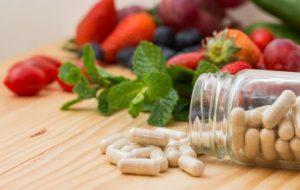by Jen Johnston, CHHC, senior marketing services account manager, for the Step into Natural blog series
The popularity of specific supplements often rises and falls in tandem with their promotion by influential bloggers, magazines, word-of-mouth, and the mainstream media. Supplements for energy are no exception.
Americans are an exhausted bunch. Statista.com reported that “Those only managing six hours sleep or less each night are, quite unsurprisingly, the most tired. Fifty-four percent of people getting six or less hours sleep wake up tired four or more days a week.” In addition to poor sleep habits, things like poor diet, dehydration, caffeine overload, and conditions such as anemia, diabetes, or those of the thyroid can all contribute to lack of energy.
On the advice of friends and also of influencers, shoppers are seeking the following types of supplements to address their energy issues.
B Vitamins
Health sites such as Livestrong promote B vitamins as supplying critical elements in the body’s energy production cycle. Without enough of them, says the author of a Livestrong article, the body won’t be able to produce enough ATP, our natural energy source. Does your store keep a supply of the various B vitamins for those consumers who wish to supplement with them? Niacin, B-6, B-12, and a B-complex are just a few to consider stocking in your pharmacy. With niacin, make sure your patients know about the non-flushing options available.

Ginseng
Popular alternative health blogger Dr. Mercola says ginseng is “one of the most popular herbal supplements in the U.S., perhaps most well-known for its traditional use of boosting memory and energy levels.” However, according to the Food Matters blog (named after the popular documentary with the same name), ginseng can have potential side effects and drug interactions, so it is important to counsel your patients appropriately on the use of this supplement.
Iodine
The ideas they promote may be considered farfetched at times, however Natural News continues to be a popular source of alternative wellness information for a growing number of people. Since at least 2008 when this post was published, they were citing lack of iodine in some diets (particularly those that reject iodized salt in favor of sea salt) as a cause of lack of energy, among other ills. Now, plenty of others are promoting this idea as well. I remember sitting at a child’s birthday party in 2013 when one of the moms brought iodine deficiency up with me – word-of-mouth marketing at its finest. But be careful with this one; Mayo Clinic says most people don’t need to supplement, and for those with certain thyroid conditions, iodine can actually make it worse.
Melatonin
If a person’s lack of energy is caused by lack of sleep, many turn to natural or synthetic forms of melatonin, a hormone made by the pineal gland. WebMD says melatonin supplements might cause problems if they are taken with some medicines, including anticoagulants, immunosuppressants, diabetes drugs, and birth control pills, so be aware and counsel patients accordingly.
Rhodiola
Consumers are reading on wellness websites like this one run by Dr. Axe, that incorporating adaptogenic herbs, such as rhodiola into their daily routine could help them feel calmer, less exhausted, and more focused. Are you carrying this herb in your store? Could you counsel a patient who had questions?
These are only a handful of supplements being promoted as energy boosters. There are many, many more.
As a pharmacist, you don’t need to 100% believe in the so-called health benefits each of these supplements has on the body. If it makes sense to offer these types of supplements based on your customer base, your job is to learn about energy supplements, understand what customers are hearing about them in the popular culture, and counsel patients appropriately. It is important to know about supplement/drug interactions. With every new drug dispensed, going over potential supplement or OTC and drug interactions can do a lot to keep patients safe and feeling secure.